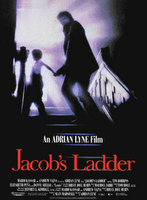 Lucky Number Slevin (Paul McGuigan, 2006)Rating:
Lucky Number Slevin (Paul McGuigan, 2006)Rating: 4.1
Formal review assignment:
After strictly observing the film’s formal and stylistic traits of Lucky Number Slevin it becomes apparent, within the first ten minutes, that the filmmakers are blatantly targeting a newer generation of moviegoers. The action is fast paced and kinetic while the director incorporates flashy camera movements and editing techniques. Match cuts, The plot is linear for the most part, but peppered with flashbacks throughout. Hartnett's character is juggled around from place to place between the two rival crime bosses and the Detective Brikowski played by Stanley Tucci and becomes a bit confusing at times. It also appears that the costume and set designers had a field day in this one as well. Every room, including the hallway of the apartment complex had interesting wallpaper designs. As for costuming, all the characters sported the latest trends, and apparently Slevin only owns variations of a similar ensemble consisting of matching slacks and a blazer over a sleeveless argyle sweater on top of a collared dress shirt. I counted at least four different variations of this combination.
Unfortunately I think this style of filmmaking relies to heavily on the visuals and editing tricks. The story, although it is supposed to have somewhat of a surprise ending, seems all too bland and ultimately predictable. Despite the ensemble cast consisting of Josh Hartnett, Bruce Willis, Lucy Liu, Morgan Freeman, and Ben Kingsley the characters weren’t very well developed and the dilemma wasn’t half as complex and witty as the film would have us believe. Perhaps all of excessive cuts, disturbances and misdirections in the plot help to created a confusing atmosphere and aid in distracting the viewer from figuring out what’s really going on in order to maintain the element of surprise at the conclusion, but I think it also obstructs the spectators overall enjoyment. J. Ralph’s original music except for the song “Kansas City Shuffle” that plays on the car radio during the final scene, is entirely diegetic and carefully layered underneath the images as not to take our focus away from the action. The soundtrack, like in most films, acts as a mediator telling us how to feel during certain scenes. For instance, as the tension builds in action sequences, so does the music, speeding up and getting louder almost in unison with the action. While during the more casual love scenes between Hartnett and Liu, we hear slower down, tempo, dreamlike background music. When trying to digest a film like this I can’t help, but think back to what Ferguson said about Citizen Kane. I felt like I couldn’t take this film serious enough to suspend my disbelief and think of it as realistic. Lucky Number Slevin just comes across as a fantastical and technically overdone crime film without any real substance behind it, using editing, tricks and flashbacks to mask the lack of depth in the story.

